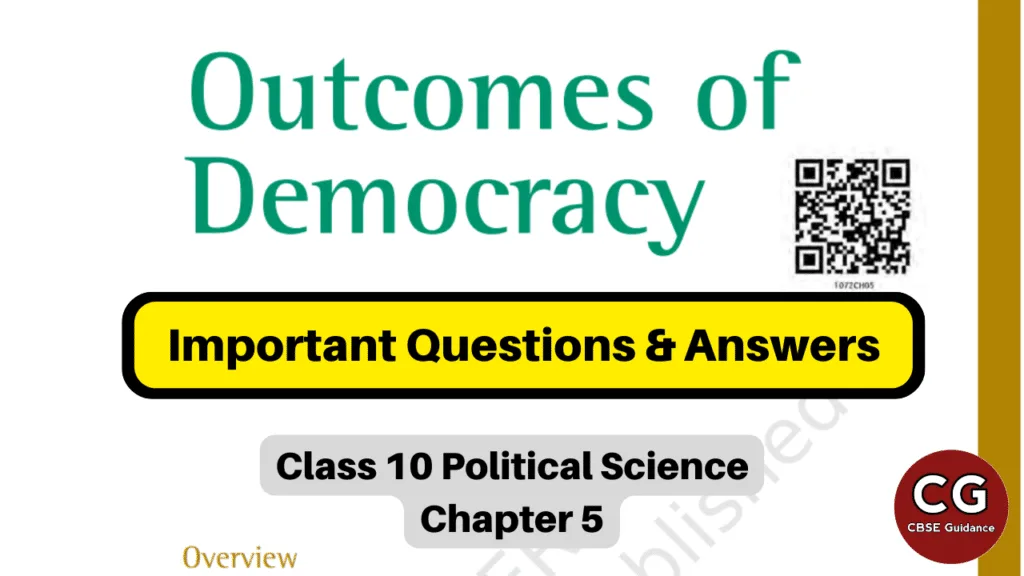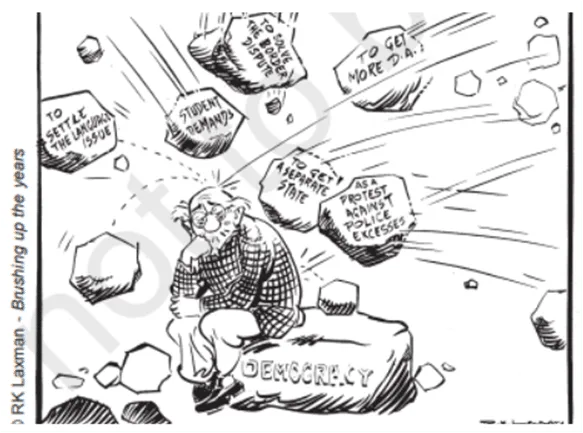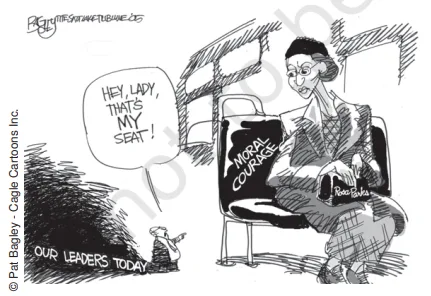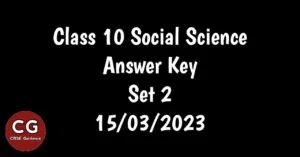Are you ready to delve deeper into the fruits of democracy and conquer Chapter 5 of your Class 10 Political Studies syllabus? This comprehensive guide to Outcomes of Democracy: Class 10 Questions & Answers is your ultimate resource!
Designed to demystify the complex concepts surrounding the positive outcomes of democracy, this blog post will equip you with the knowledge and confidence to excel in your upcoming CBSE board exams.
This blog post goes beyond questions and answers, offering valuable resources to enhance your learning experience:
- Downloadable PDF: Access a comprehensive collection of questions and answers for offline study and revision.
- In-depth explanations: Gain deeper insight into key concepts with clear and concise explanations.
- Real-world examples: Connect theoretical knowledge to practical scenarios with relevant examples.
- Exam preparation tips: Strengthen your exam preparation strategy with valuable tips and techniques.
So, grab your notebooks, sharpen your pencils, and get ready to embark on a captivating journey to understand the true power and impact of democracy!

| Subject | Social Science (Political Science) |
| Class | 10 |
| Board | CBSE and State Boards |
| Chapter No. | 5 |
| Chapter Name | Outcomes of Democracy |
| Type | Important Questions & Answers |
| Session | 2024-25 |
"The only way to do great work is to love what you do."
- Steve Jobs
Outcomes of Democracy Class 10 Questions and Answers
Q. No. 1) Multiple Choice Questions (MCQs)
i. Some delay in decision-making is bound to take place in a democracy because it is based on the idea of _____.
a. Universal adult franchise
b. Accountable government
c. Deliberation and negotiation
d. Power sharing
Ans. Option (c).
ii. If a government provides its citizens a right and means to examine the process of decision, it is _____.
a. An accountable government
b. A responsive government
c. A transparent government
d. A stable government
Ans. Option (c).
iii. Democracy is considered better because:
a. Promotes equality among citizens
b. Enhances the dignity of an individual
c. Provides a method to resolve conflicts
d. All of the above
Ans. Option (d).
iv. Which of the following option best signifies this cartoon?

a. Demand for a separate state from Democratic government
b. Democratic government is facing territorial issues with the bordering states
c. Democratic government is coping with multiple pressures through accommodation
d. Democratic government accepts demands based on separate state
Ans. Option (c).
v. Which of the following is not necessary to measure a democracy?
a. Regular free and fair elections
b. Open public debate on major policies
c. High economic growth
d. Citizen’s right to information
Ans. Option (c).
vi. More than economic development, it is reasonable to expect democracies to reduce economic _____.
a. Disparities
b. Opportunities
c. Equalities
d. All of the above
Ans. Option (a).
vii. Democracy is not a guarantee to _____.
a. Political stability
b. Social equality
c. Economic development
d. None of the above
Ans. Option (c).
viii. Complete the following sentence:
Democracy remains a democracy as long as every citizen has a chance of _____.
a. Casting their vote in the elections
b. Have free and fair elections
c. Being in a majority at some point of time
d. None of the above
Ans. Option (c).
ix. The fact that people are complaining about is a testament to the _____.
a. Success of democracy
b. Failure of democracy
c. Irrelevance of public opinion
d. Lack of rights in a democracy
Ans. Option (a).
x. Democracy transforms people from the status of a subject into that of a _____.
a. Representative
b. Citizen
c. Voter
d. Ruler
Ans. Option (b).
xi. “Most individuals today believe that their vote makes a difference to the way the government is run.” This is a testimony that democracy promotes:
a. Economic equality
b. Accommodation of diversity
c. Dignity and freedom of a citizen
d. None of the above.
Ans. Option (c).
xii. Country P has recently adopted democracy after a long struggle. Which of the following outcomes can the citizens of this country DEFINITELY expect due to this change?
a. Sharp decrease in poverty in all communities
b. More accountability on part of the government
c. A drastic rise in the national income due to sharp economic growth
d. Rules and laws to be drafted according to the needs of the majority groups
Ans. Option (b)
xiii. There are two statements marked as Assertion (A) and Reason (R). Mark your answer as per the codes provided below:
- Assertion (A): Democracy is an accountable, responsive, and legitimate government.
- Reason (R): Democracies have regular, free, and fair elections and decision-making is based on norms and procedures.
a. Both A and R are true and R is the correct explanation of A.
b. Both A and R are true but R is not the correct explanation of A.
c. A is true but R is false.
d. A is false but R is true.
Ans. Option (a).
xiv. Assertion (A): Democracies are based on political equality.
Reason(R): All individuals have an equal say in electing representatives.
a. Both (A) and (R) are true and (R) is the correct explanation of (A)
b. Both A and R are true and R is the correct explanation of A.
c. (A) is correct but (R) is wrong
d. (A) is wrong but (R) is correct
Ans. Option (a)
Q. No. 2) State whether true or false
If you consider all democracies and dictatorships for the fifty years between 1950 and 2000, dictatorships have a slightly higher rate of economic growth.
Ans. True.
Q. No. 3) Explain the common features of democracies.
Ans. The following are the common features of democracies:
- Regular elections: In a democratic government, general elections are held to elect a new government.
- Right to vote: All the citizens of the country, of and above a certain age, have the right to vote.
- Political parties: political parties are an essential part of democracy. They put up candidates who contest the election.
- Rule of law: Another common feature of all democracies is that it ensures rule of law. Law is supreme and all citizens are equal in the eyes of law. No one is above the law.
Q. No. 4) What should be the most basic outcome of democracy?
Ans. The most basic outcome of democracy should be:
- Accountable government
- Responsive government.
Q. No. 5) “Democracy is based on the idea of deliberation and negotiation.” Examine the statement.
Ans.
- Democracy gives importance to deliberation and public opinion.
- The democratic government will take more time to follow procedures before arriving at a decision.
- Its decisions may be both more acceptable to the people and more effective.
- Democracy ensures that decision-making will be based on norms and procedures.
- Transparency as persons have the right and the means to examine the process of decision-making.
- It follows procedures and is accountable to the people.
- The democratic government develops mechanisms for citizens to hold the government accountable.
- The democratic government follows mechanisms for citizens to take part in decision-making whenever they think fit.
Q. No. 6) What is meant by transparency?
Ans. The right or means to examine the process of decision-making is called transparency.
Q. No. 7) “A democratic government is efficient and effective.” Analyze the statement.
Or,
“The cost of time that democracy pays is perhaps worth it.” Justify.
Ans.
- Imagine a government that may take decisions very fast. But it may take decisions that are not accepted by the people and may, therefore, face problems.
- In contrast, the democratic government will take more time to follow procedures before arriving at a decision.
- However, because it has followed procedure, its decisions may be more acceptable to the people and more effective. So, the cost of time that democracy pays is perhaps worth it.
Q. No. 8) What are the different ways in which a democracy ensures accountable, responsive, and legitimate government?
Ans.
- A democratic government develops mechanisms for citizens to take part in the decision-making process. For these free and fair elections, open debate on major policies, legislation, and the right to information is there in good democracies. Therefore, democracies are called accountable governments.
- Democracy is a responsive government. It is responsive to the needs and expectations of the citizens. It makes policies for the welfare of the citizens.
- A democratic government is a legitimate government. It is elected by the people and people wish to be ruled by the representatives elected by them.
Q. No. 9) Why is a democratic government referred to as a legitimate government?
Ans.
- A democratic government is called a legitimate government because it is the people’s own government.
- There is great popular support for the idea of democracy all over the world.
- People wish to be ruled by representatives elected by them.
- Democratic government is attentive to the needs and demands of the people.
Q. No. 10) “Democracy’s ability to generate its own support is itself an outcome that cannot be ignored.” Support the statement with examples.
Ans.
- Democracy ensures that decision-making will be based on norms and procedures.
- Every citizen has the right and means to examine the process of decision-making.
- Democratic governments are accountable, legitimate, and transparent governments.
- People have the right to choose their rulers.
- Democracy gives its citizens the right to information about the government and its functioning.
- A democratic government is the people’s own government and it is run by the people.
Q. No. 11) How can we measure democracy based on expected outcomes?
Ans. To measure a democracy based on its expected outcomes we have to observe the following practices and institutions:
- In a democracy, there should be free and fair elections.
- There should be open criticism and debate on major policies and legislation.
- Citizens should have the right to information about the functioning of government.
Q. No. 12) What is the relationship between democracy and the economic growth of a country?
Ans. Relationship between democracy and the economic growth of a country:
- During the last 50 years, dictatorships have shown a slightly higher rate of economic growth compared to democracies.
- But many other factors determine the economic growth of a country like – population size, global situation, cooperation from other countries, economic priorities adopted by the country, etc.
- So even when there is a nominal difference in the rate of economic growth between countries under dictatorship and democracy, it is better to prefer democracy as it has several other positive outcomes like dignity and freedom of citizens.
Q. No. 13) Explain the relationship between democracy and development.
Ans. Relationship between democracy and development:
- Democracies are expected to produce development.
- Development depends upon many factors, i.e., the size of the population, global situation, cooperation from other countries, etc. In democracies, time is taken to discuss and reach a decision. So, it is slow, but it is not unjust or inappropriate.
Q. No. 14) ‘There is overwhelming support for the idea of democracy in South Asia.’ Support the statement with examples.
Ans.
- Democratic government is the people's own government.
- Countries from South Asia want democratic rights for people.
- Countries want to elect their representatives by themselves.
- Democracy provides dignity and freedom to its citizens.
- Democracy accommodates social diversity.
- Democracy is based on the idea of discussion and negotiation.
- For example India, Nepal, Bangladesh, Sri Lanka, and Pakistan.
Q. No. 15) Differentiate between democratic and non-democratic government.
Ans.
- Democratic governments are transparent, legitimate, and accountable whereas non-democratic governments are selected and formed at their own discretion.
- The democratic government provides dignity and freedom to all without any discrimination.
- Conflicts are resolved through debate, discussions, and negotiation rather than discretion.
- Minority and majority cooperation are common phenomena in the democratic government.
- Enhances the dignity of all without any discrimination.
Q. No. 16) How is Democracy a better form of government when compared with dictatorship or any other alternative government?
Ans. Democracy is a better form of government when compared with dictatorship or any other alternative form of government because it:
- Promotes equality among citizens.
- Enhances the dignity of the individual.
- Improves the quality of decision-making.
- Provides a method to resolve conflicts.
- Allows room to correct mistakes.
Q. No. 17) Are democracies based on political and economic equality? Explain.
Or,
Does democracy lead to a reduction of inequality and poverty? Explain.
Ans.
- Democracies are based on political equality and all individuals have an equal role in electing representatives.
- However, parallel to the process of bringing individuals into the political arena, we find growing economic inequalities.
- A small number of ultra-rich enjoy a highly disproportionate share of wealth and incomes, while the poor find it difficult to fulfill their basic needs of life like food, shelter, and clothing.
- The poor constitute a high proportion of our voters and no party would like to lose their votes.
- However, democratically elected governments do not appear to be keen to address the problem of poverty as people may expect.
Q. No. 18) “Democracy accommodates social diversities.” Support the statement with examples.
Ans.
- Democracies develop a procedure to conduct their competition. This reduces the possibility of these tensions becoming explosive or violent.
- No society can fully and permanently resolve conflicts among different groups. But we can certainly learn to respect these differences and can evolve a mechanism to negotiate these differences.
- The ability to handle social differences, divisions, and conflicts is a definite plus point of democratic regimes.
- Example: Belgium has successfully negotiated differences among its ethnic population. This reduces the possibility of tensions.
Q. No. 19) Do democracies lead to peaceful and harmonious life among citizens? Clarify.
Ans. i. Non-democratic regimes often turn a blind eye to or suppress internal social differences. The ability to handle social differences, divisions, and conflicts is thus a definite plus point of democratic regimes.
ii. But, the example of Sri Lanka exhibits that democracy must fulfill two conditions in order to achieve this outcome:
- Democracy is not simply ruled by majority opinion. The majority always needs to work with the minority so that governments function to represent the general view.
- Rule by the majority does not become rule by the majority community in terms of religion or race or linguistic group, etc.
Q. No. 20) What are the two conditions necessary to ensure that democracy accommodates social diversity?
Ans.
- It is necessary to understand that democracy is not simply ruled by majority opinion. The majority always needs to work with the minority so that governments function to represent the general view.
- It is also necessary that rule by the majority does not become rule by the majority community in terms of religion or race or linguistic group, etc.
- Rule by majority means that in the case of every decision or in the case of every election, different persons and groups may and can form a majority.
Q. No. 21) ‘Respect and equal treatment of women are necessary ingredients of a democratic society.’ Examine the statement.
Ans.
- Economic independence or access to an inherited or self-generated income is considered to be the major means of empowering women.
- Equal political and civil rights as men.
- Ways of autonomy and freedom.
- Distributive justice to reduce inequalities in resources and power.
- Love, universal brotherhood, sincerity, honesty, integrity of character, and a firm attitude of rendering help.
- Removing social evils including violence, torture, humiliation, etc.
Q. No. 22) How does democracy assure the dignity of women and prevent caste inequalities?
Or, Explain the message shown in the cartoon below.

Ans.
- In the case of the dignity of women, most societies across the world were historically male-dominated societies.
- Long struggles by women have created some sensitivity today that respect for and equal treatment of women are necessary ingredients of a democratic society.
- That does not mean that women are actually always treated with respect. But once the democratic principle is recognized, it becomes easier for women to wage a struggle against what is now unacceptable legally and morally.
- Democracy in India has strengthened the claim of the disadvantaged and discriminated castes for equal status and equal opportunity.
- There are still instances of caste-based inequalities and atrocities, but these lack moral and legal foundations.
Q. No. 23) Explain any four areas where democracy has failed.
Ans.
- If democracy is expected to produce good government then it is fair to expect that it would also produce development. Evidence shows that many democracies did not fulfill this expectation. The inability of democracy to achieve higher economic development worries us.
- Democracy is a government of the people. Hence one can expect it to reduce economic disparities. But, it is a bitter truth that even when a country achieved economic growth, wealth is not distributed in such a way that all citizens of the country will share and lead a better life.
- Democracy has also failed on the issue of poverty reduction. A smaller number of ultra-rich enjoy a highly disproportionate share of wealth and income. Those at the bottom of society have very little to depend upon. The income has been declining.
- Democracies often frustrate the need of the people and often ignore the demands of the majority of their population. The routing talks of corruption are enough to convince us that democracy is not free of evil.
Q. No. 24) What are the reasonable outcomes that one may expect from democracy?
Ans.
- A democratic government can be expected to be an accountable, responsive, and legitimate government.
- Democracy accommodates social diversity and ensures peace and harmony in society.
- Democracy promotes the dignity and freedom of the individual.
Q. No. 25) Constant complaints by people can be seen as a testimony to the success of democracy. Explain.
Ans.
- Complaints highlight the awareness of the people and their expectations of the system that has been put in place.
- It reflects that citizens are not overawed by those in power and can objectively and critically examine the difference they have made.
- It is a measure of their participation in public debates.
- A public expression of dissatisfaction with democracy shows the success of the democratic project.
- It shows that people have transformed themselves from being subject to being citizens.
Q. No. 26) A think tank has been given the task of designing an outline to measure how successful has democracy been in any country.
Discuss the key indicators that the think tank should consider while designing this outline and explain why these factors are crucial in assessing the outcomes of democracy.
Ans.
- Free and fair elections: this represents a healthy democratic process in place.
- Citizen's right to information: this is important since only after having the right information can the citizens hold the government accountable.
- Protection of minority rights: this represents a strong commitment to democratic principles as this would enable the minority community to participate in the decision-making processes.
- Poverty: reduction in poverty over the years would indicate the successful implementation of democracy.
- Rule of law: presence of institutions like an independent judiciary helps uphold law and ensures fairness, justice, and equal treatment to citizens.
Hope you liked these Questions and Answers on Chapter 5 Outcomes of Democracy Class 10 Political Science (Civics). Please share this with your friends and do comment if you have any doubts/suggestions to share.


SIR YOU ARE LEGEND 🤞🤞
WHEN I WILL CRACK MY BOARDS…. THE WHOLE CREDIT WILL BE UR….
THANKS SIR
LOVE FROM JAMMU AND KASHMIR 🖤🖤🖤
Your are most welcome 🤗 Rehan. Keep studying and enjoy 😊
Hlo. Bhaiya,, isse help hua boards Mein….?? Isko. Padhne ke Baad kuch krna pada…?
Sir
Plz upload some important question on gender,religion and caste and political parties
Okay soon
Sir afraid 😰😰😰
Darr ke aage jeet hai
Sir is there any pictures from the text is deleted from this chapter?
Sir mujhe aap kch tips dijiye na maths ke liye
Iske liye detailed strategy bada diye hai “Last one month strategy me” usko follow karo.
Sir aap please mjhe kch tips dijiye maths ke liye.
Maths ke exam me kaise accha score karu
Hello sir !
Thanks for these wonderful notes. Now, I believe that I will score good in boards. Again thank you a lot, sir
Is it enough for boards sir??🫰
Sirr aap to crorepati honge